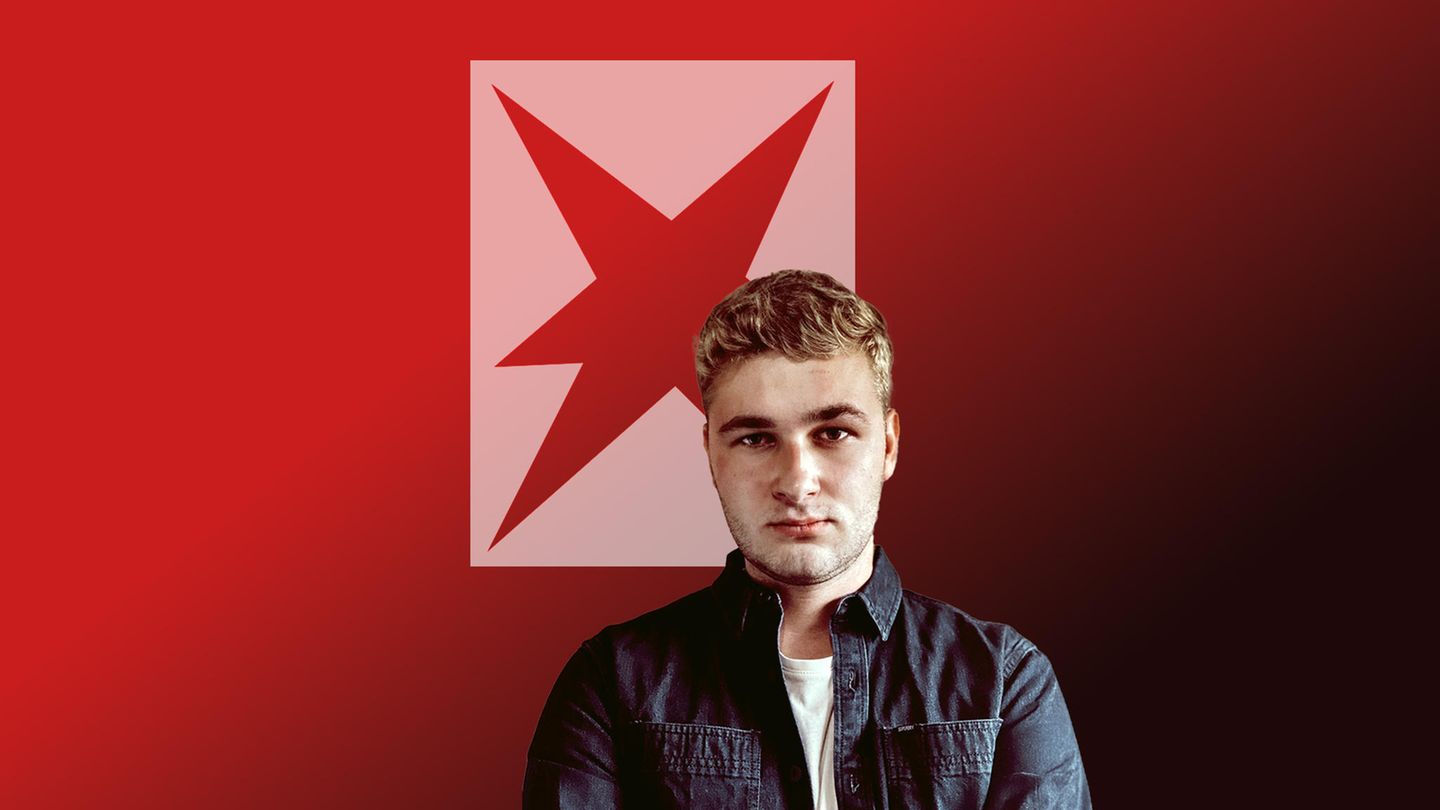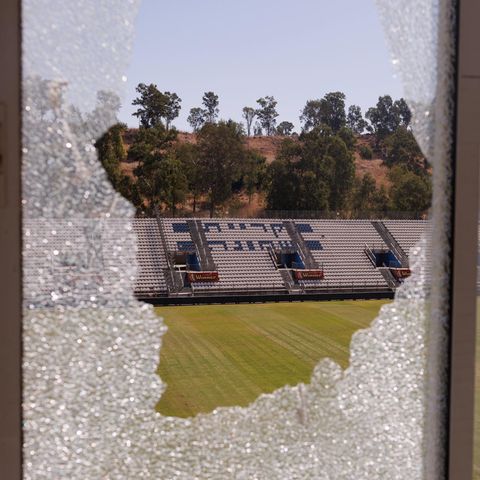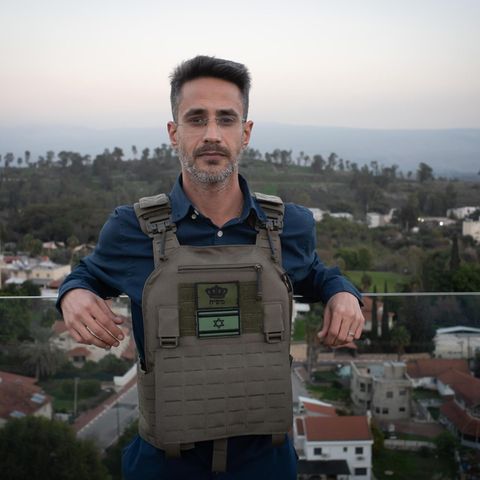Copy the current link
Report from the combat zone in Israel during the day and relax on the beach in the evening. Our reporter always asks himself: Can you just call it a day during a war?
I pack my suitcase and take with me: a flak jacket, the combat helmet, sunscreen and two swimming shorts. That’s how it always works when I work for him star fly to Tel Aviv. Anyone reporting from Israel these days is oscillating between two galaxies. Out and about in the depopulated battle zone during the day, back in the evening in the hustle and bustle of the big city. From rocket craters to sand castles it takes just under two hours on the highway.
The temptation is great, even most recently in September. My Tel Aviv hotel is in the second row to the beach. The Middle Eastern autumn is still pleasantly hot and that working day was a particularly long one, far in the north, on Israel’s front with Hezbollah. Prime Minister Benjamin Netanyahu was preparing his ground offensive in Lebanon. Explosive-laden drones, mortar shells and Katyusha rockets fly across the border every day. Things can get very tricky up there, very quickly.
The beach is the place “to sort out all the shit in your head”
The protective gear on the passenger seat is still simmering as I turn into the home straight of my journey home: the promenade of Bograshov Beach.
Less than 15 minutes later my feet sink into the velvet sand. I lie between joggers, stoners, couples, lived and loved normality. The house bass of a boom box is mixed with the cacophonous popping of the Matkot players, Israel’s unofficial national sport, a kind of beach tennis without net and without lines, but practiced with an ambition, as if one were playing for the two-state solution. My beach neighbor Dor is practicing handstands in the evening sun. He comes every day, he says. “It’s time for me. To sort everything out in my head. All the shit that’s going on right now.”
The shit that’s going on: bombs on Gaza, failed hostage deals, exploding pagers, violent settlers, barbaric Islamists, threatening mullahs, war-crazed Bibi, divided Israel. And in the middle of this raging chaos, like in the eye of a hurricane: me on a beach towel, with a burning question in my head. Can you call it a day after war?
Tel Aviv is a city that flows toward water, not the other way around. When there was a ban on swimming during the pandemic, people protested until the mayor let them back into the sea. There are thirteen beaches here, like themed worlds in an amusement park. The dog beach, the gay beach and right next to it, surrounded by wooden privacy walls, the Orthodox beach. Open Mondays and Wednesdays for men; Sundays, Tuesdays, Thursdays for women; on Shabbat for everyone, provided they dress modestly.
Now that there are no tourist crowds in Israel, Tel Avivians have their sandy living room to themselves for once. And they just can’t live without it.
Every time jumping into the water feels wrong
Just for a few breathless weeks after the Hamas atrocities of October 7, 2023, the parasols were stuck in the sand like rotting mushrooms in late autumn. But people were soon drawn back to the water. Military helicopters whirred overhead toward their mission in Gaza. The air alarm – initially daily, then only sporadically – quickly faded into a mere wake-up call that this country is actually still in the fight for survival. People just stayed there. They no longer ran into the bunkers. They came to terms with the new everyday life. And I can understand her.
When I jump into the waves of the Mediterranean in the evening, it’s like a spa. As if I were washing myself clean of everything I had experienced, heard and seen during the day. About the pictures of dead children that emergency doctors send me from Gaza. About the tearful conversation I had at lunchtime at the kitchen table of a traumatized Israeli family. From the bitter realization that nothing will get better here any time soon, that this region is racing towards a dead end and can no longer find its way back.
Just a few minutes of blissful peace. Dive under, take a breather, switch off. I know that this is a luxury that the people of Gaza cannot afford. Every time it feels wrong to splash around here, while somewhere behind the silhouette of the old bell tower of Jaffa, less than 100 kilometers south, on the same sea, in front of the same waves, hundreds of thousands of Palestinians are holding out in windy tents.
Tel Aviv has long been decried by Israelis from the countryside, from the vulnerable border areas, as a city of ignorance, shielded by an almost impenetrable air defense system. The world may end, but here milk, honey and the perfectly balanced designer drinks are still flowing onto an ice cube in a tumbler glass. As a reporter, I am part of this bubble. I drink, stroll and bathe. Only to report again the next day about suffering, pain and violence. In the war of my thoughts, the instinct of self-preservation always wins over moral demands in the end: everyone has to slow down in order to be able to run at full speed again the next morning. Even – or better: especially – in a crisis area.
A lifeguard became a symbolic figure of Israel
So one last day at the sea. Saturday, Jewish day of rest, 31.2 degrees, Charles Clore Beach. The family beach, if you will. With barbecue areas and picnic areas. Red flags above the whitewashed rescue tower signal a swimming risk that is not entirely insignificant today. The current off Tel Aviv is treacherous. When there are waves, invisible underwater hands cling to your ankles and pull you further and further into the depths. Fatal accidents occur every year.
On his perch, Shimon Abotbol still looks at a patchwork of colorful towels. Before I can step onto the lifeguard’s throne, he sprays the sand off my feet. Then he asks, “How did you find me?”
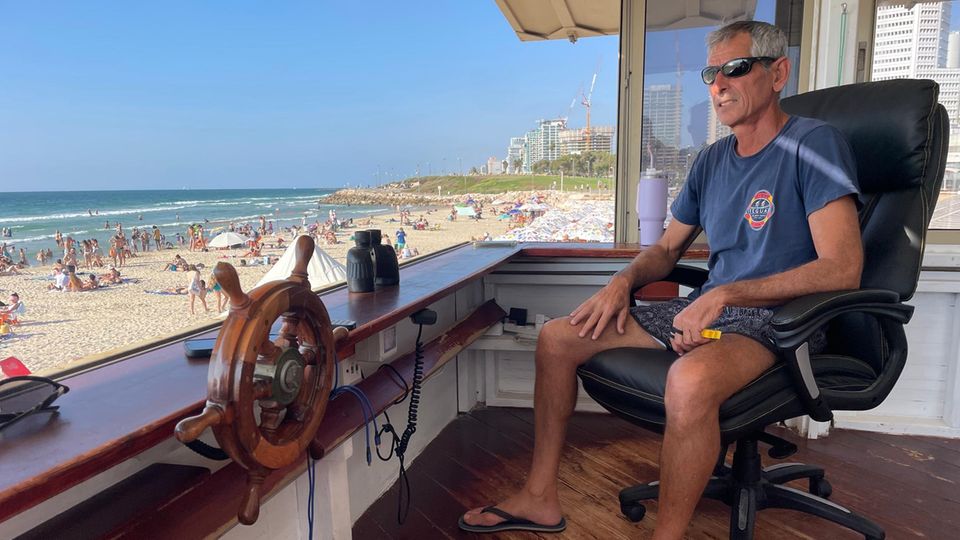
The lifeguards of Tel Aviv have always had legendary status. How they looked down from their balustrades, so Poseidon-like, rarely bothering to look down, preferring instead to reprimand “the woman in the green bikini” or “the boy in the red swimming trunks” over their tinny loudspeakers. Abotbol, however, became famous for a much more heartfelt announcement. On a scorching hot June day in 2024, he shouted four names across Charles Clore Beach:
Noa Argamani
Shlomi Ziv
Almog Meir
Andrey Kozlov
Israeli special forces had recently freed them from Hamas hideouts in Gaza. The Tel Aviv city government sent a pre-written text to all its beach guards asking them to spread the rare good news to bathers. Abotbol read as ordered, the crowd beneath him erupted in cheers, someone was filming, the video went viral. For a few days this summer, a lifeguard became a symbol of Israel.
Question of conscience for the flip-flop hero: Is it really right to go swimming without a care in the world while the deaths in Gaza don’t stop and dozens of Israelis are still stuck in terror tunnels? Shimon Abotbol thinks: “People come here to forget the war for a moment. People here don’t have a balagan.” Balagan, Hebrew for: chaos in the head, constant state of mind in this part of the world.
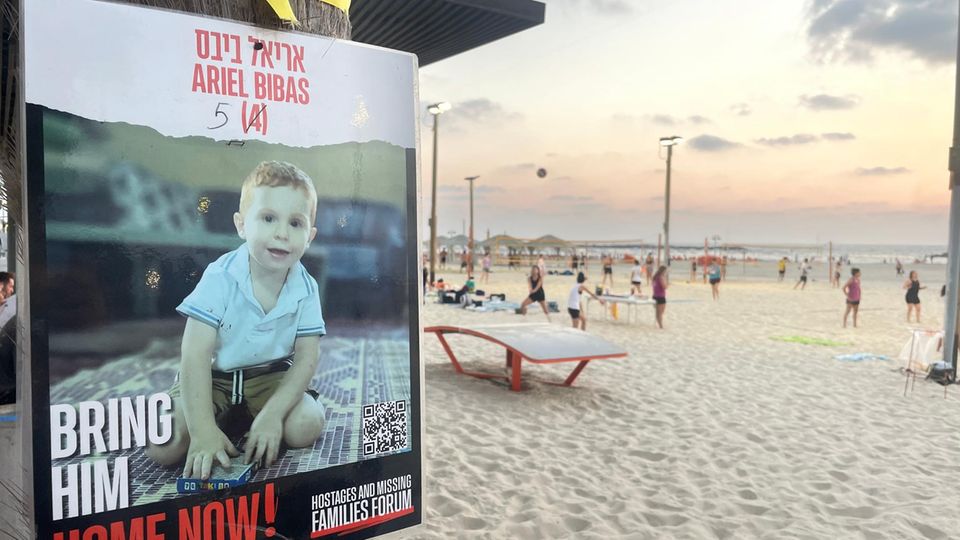
A few weeks after the hostages were rescued, a drone from the Yemeni Houthi militia hits the heart of Tel Aviv. It hits right behind my hotel, third row to the beach, near Bograshov Beach. The missile defense capsule is exceptionally permeable. A man dies. But for everyone else, life must go on. The date, the joint, the matkot game on the beach. That’s how it’s always been here.
When war clouds gather over the promised land, the people underneath always reassure themselves of their own existence with three memorable words: Am Israel Chai! The people of Israel are alive!
And as long as people are drawn to the beach in Tel Aviv, Israel will live.
Source: Stern
I have been working in the news industry for over 6 years, first as a reporter and now as an editor. I have covered politics extensively, and my work has appeared in major newspapers and online news outlets around the world. In addition to my writing, I also contribute regularly to 24 Hours World.

